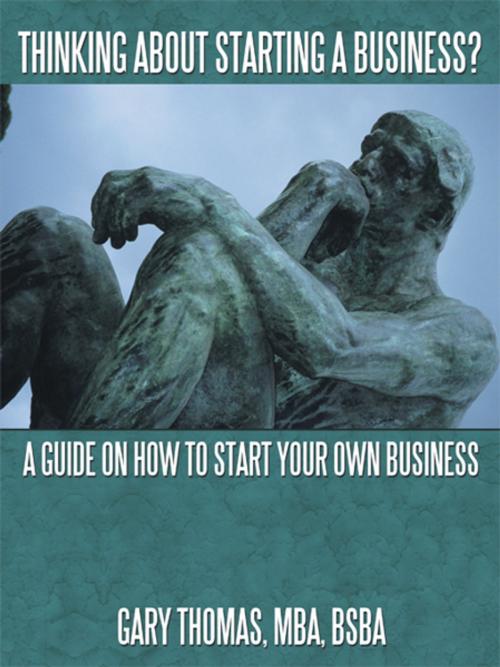Thinking About Starting a Business?
A Guide on How to Start Your Own Business
Nonfiction, Computers, Application Software, Business Software, Business & Finance, Entrepreneurship & Small Business, New Business Enterprises, Industries & Professions, Industries| Author: | Gary Thomas | ISBN: | 9781468543315 |
| Publisher: | AuthorHouse | Publication: | January 31, 2012 |
| Imprint: | AuthorHouse | Language: | English |
| Author: | Gary Thomas |
| ISBN: | 9781468543315 |
| Publisher: | AuthorHouse |
| Publication: | January 31, 2012 |
| Imprint: | AuthorHouse |
| Language: | English |
Why should you go to the trouble of creating a written business plan? There are three major reasons:
The process of putting a business plan together, including the thought you put in before beginning to write it, forces you to take an objective, critical unemotional look at your business project in its entirety. The finished product your business plan is and operating told which, properly used, will help you manage your business and work toward its success. The completed business plan is the means for communicating your ideas to others and provide the basis for your financing proposal.
The importance of planning cannot be overemphasized. By taking an objective look at your business you can identify areas of weakness and strengths, pinpoint needs you might otherwise overlook, spot problems before they arise, and begin planning how you can best achieve your business goals. As an operating tool, your business plan helps you to establish reasonable objectives and figure out how to best accomplish them. It also helps you to red-flag problems as they arise and aids you to identifying their sources, thus suggesting ways to solve them. It may even help you avoid some problems altogether.
This handbook has been designed with these considerations in mind. In order for it to work it is important that you do as much of the work as possible. A professionally prepared business plan wont do you any good if you dont understand it thoroughly. This understanding comes from being involved with its development from the very start.
No business plan, no matter how carefully constructed and no matter how thoroughly understood, will be of any use at all unless you use it. Going into business is rough; over half of all new businesses fail within the first two years of operation and over 90 percent fail within the first 10 years. A major reason for failure is lack of planning. The best way to enhance your chances of success is to plan and follow through on your planning.
Use your plan. Dont put it in the bottom drawer of your desk and forget it.
Your business plan can help you avoid going into a business venture that is doomed to failure. If your proposed venture is marginal at best, the business plan will show you why and may help you avoid paying the high tuition of business failure. It is far cheaper not to begin an ill-fated business than to learn by experience what your business plan could have taught you at several hours of concentrated work.
Finally, your business plan provides the information needed by others to evaluate your venture, especially if you need to seek outside financing. A thorough business automatically becomes a complete financing proposal which will meet the requirements of most lenders.
Why should you go to the trouble of creating a written business plan? There are three major reasons:
The process of putting a business plan together, including the thought you put in before beginning to write it, forces you to take an objective, critical unemotional look at your business project in its entirety. The finished product your business plan is and operating told which, properly used, will help you manage your business and work toward its success. The completed business plan is the means for communicating your ideas to others and provide the basis for your financing proposal.
The importance of planning cannot be overemphasized. By taking an objective look at your business you can identify areas of weakness and strengths, pinpoint needs you might otherwise overlook, spot problems before they arise, and begin planning how you can best achieve your business goals. As an operating tool, your business plan helps you to establish reasonable objectives and figure out how to best accomplish them. It also helps you to red-flag problems as they arise and aids you to identifying their sources, thus suggesting ways to solve them. It may even help you avoid some problems altogether.
This handbook has been designed with these considerations in mind. In order for it to work it is important that you do as much of the work as possible. A professionally prepared business plan wont do you any good if you dont understand it thoroughly. This understanding comes from being involved with its development from the very start.
No business plan, no matter how carefully constructed and no matter how thoroughly understood, will be of any use at all unless you use it. Going into business is rough; over half of all new businesses fail within the first two years of operation and over 90 percent fail within the first 10 years. A major reason for failure is lack of planning. The best way to enhance your chances of success is to plan and follow through on your planning.
Use your plan. Dont put it in the bottom drawer of your desk and forget it.
Your business plan can help you avoid going into a business venture that is doomed to failure. If your proposed venture is marginal at best, the business plan will show you why and may help you avoid paying the high tuition of business failure. It is far cheaper not to begin an ill-fated business than to learn by experience what your business plan could have taught you at several hours of concentrated work.
Finally, your business plan provides the information needed by others to evaluate your venture, especially if you need to seek outside financing. A thorough business automatically becomes a complete financing proposal which will meet the requirements of most lenders.















